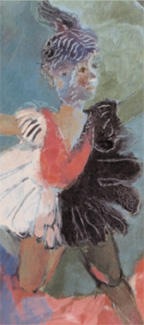| CANADIAN
PRESS
April
13, 2003
B.C.
writers study effects of negative emotions on business,
health
by Amy Carmichael
There's one in every office. A person who
picks up the pieces after a water-cooler clash, offers encouragement
after a dressing down by the boss or buys drinks when someone
else is awarded the promotion.
These people don't have titles and the vital role they play
in keeping companies chugging along is barely acknowledged.
But if Peter Frost could print them business cards he would
use the super-heroish title: Toxic handlers.
"These people, they could be managers, human resource
personnel, co-workers, are being sent into battle with a
plastic fork for a weapon," says Frost, author of Toxic
Emotions At Work and a commerce professor at the University
of British Columbia.
He argues they aren't given to tools to deal with the emotions
they are cushioning, which he says are contagious and harmful
to their health.
The attack of the mind on the body and the connection between
brains and hearts is the subject of another book just released
by Gabor Maté. The charismatic doctor has written
for the Globe and Mail, headed palliative care unit at Vancouver
General hospital and works with addicts on the skid row
Downtown Eastside.
A woman who introduced his recent reading of When the
Body Says No at the Central Library was shocked to
see the hall fill up and throngs turned away because all
the seats were taken.
"I haven't seen so many hundreds turn out since our
lecture on tantric sex," she says.
Maté explained to the audience, many of whom suffered
from diseases and were looking for answers, about the dark
side of emotions and the havoc they wreak on body chemistry.
Working family practice, Maté said he began to notice
a pattern of emotional repression among people with diseases
from cancer to ALS and multiple sclerosis. They were like
Frost's toxic handlers, too nice, constantly putting others
needs before their own. They didn't know how to say no,
weren't able to express anger in a healthy way.
"Noticing these things on my own, I just thought I
was a solitary genius. Which I am," Maté deadpanned.
"But it turns out, not as solitary as I thought.
"The same observations have been made by dozens of
other doctors for decades, not to mention those by Ayurvedic
(traditional Hindu medicine) and tribal medicine over thousands
of years, and the research has been done."
Mostly though, Frost and Maté illustrate their points
with people's stories. Frost has met numerous chief executives
who feel their cancers and heart diseases were due in part
to constantly dealing with office conflict.
Maté describes past patients and famous people from
Pamela Wallin to Gilda Radner and Jacqueline du Pre. All,
he said, suppressed their own feelings and desires to please
others. The culmination of that process was a serious disease,
he said.
His theory is that emotional repression induces stress reactions
in their bodies, hiking hormones like cortisol, enlarging
adrenal glands and eventually affecting our immune system's
ability to ward off illness.
This is not an argument the mainstream medical profession
gives much credence. But audience members pumped their heads
up and down, nodding in agreement at his theories like they
had experienced the very same thing.
But the Canadian Cancer Society said people have to be careful
with theories like Frost's and Maté's because not
enough studies have been done to prove stress can cause
illness.
"It's kind of like reading a horoscope. Who doesn't
have stress in their lives?" said Barbara Kaminsky,
a director of the Canadian Cancer Society.
A woman listening to Maté's reading agreed.
"He's coming very close to saying 'you brought this
on yourself,' " said Sandra Konkin, a Vancouver teacher
who suffers from MS. "A lot of people have boundary
issues and difficulty saying no."
"But at the same time, it's common sense. Our problems
take a toll and dealing with them will make us happier and
healthier. I've got a lot to work through."
Kaminsky she said there is certainly a movement in the health
care industry "largely directed by patients,"
to take the body-mind connection into consideration when
treating disease.
"Certainly we will see more of that as the baby-boom
generation ages," she said. "They have been able
to travel and the Internet and TV has broadened their world
and introduced them to a much broader range of approached
to health care."
The cancer society supports integrated care facilities where
alternative therapies, from yoga to meditation, are practised
alongside conventional medicine.
BACK |
Now comes Gabor Maté , an
insightful, no-nonsense, and thoroughly compassionate
physician who provides an overview of all these perspectives
and comes to the marvelously humane conclusion that ADD/ADHD
is neither nature (genetics) nor nurture (parenting/environment)
but, rather, the result of the collision of a predisposing
nature with an ADD-hostile life situation, family, school,
or job. How refreshing!
-Thom
Hartman, author of ADD: A Different Perception and many
other books about ADD |
|
Home
| Dr. Gabor Maté | About
the Book | Read the Book | Dr. Maté's Articles
Book Reviews | Press
Clips
| Reader's Reviews | Audio/Video | Ordering
Info
| Email
jeremedia©
2003
|
|


